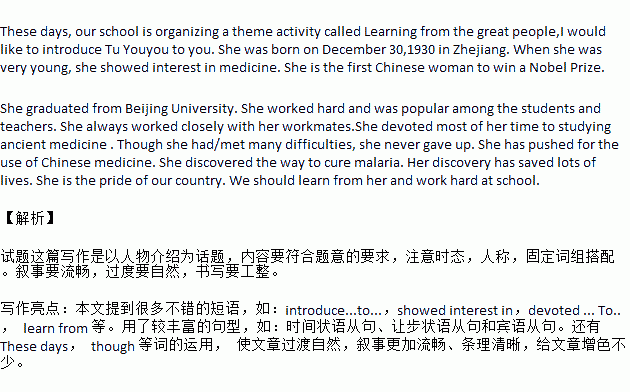题目内容
近日,学校开展向名人学习的主题活动。我准备向全班同学介绍屠呦呦的事迹,内容如下:
基本情况 | Tu Youyou,1930年12月30日出生于浙江。 很小的时候,她就表现出对医学的兴趣。 是第一个获得诺贝尔奖的中国女性。 |
主要经历 | 1.1950年毕业于北京大学,在学校她学习刻苦,深受同学和老师的喜欢。 2.一直和同事亲密合作。 3.把大部分时间都投入到古代医学研究中。 4.尽管遇到困难,她并没有放弃。 |
主要成就 | 1. 努力推进中医运用。 2.发现了治疗malaria(疟疾)的方法。 3.她的发现拯救了很多生命。 |
我的感想 | 她是我们国家的骄傲。 我们应该……(至少发挥两点) |
注意事项:
1. 词数在100个左右,短文开头已在答题卷上给出,不计入总词数;
2. 短文内容必须写在答题卷指定的位置上。
3.参考词汇:push for(推进) Nobel Prize(诺贝尔奖) discovery(n.发现)
These days, our school is organizing a theme activity called Learning from the great people. I would like to introduce TuYouyou to you, ________________________________________________________________________________________________________________________________________________________________________________________________________________________________________________________________________________________________________________________________________________________________________________________________________________________________________________________________________________________________________________________________________________________________________________________________________________________________________________________________________________________________________________________________________________________________________________________________________________________________________________________________________________
In my opinion,___________________________________________________________________________________________________________

